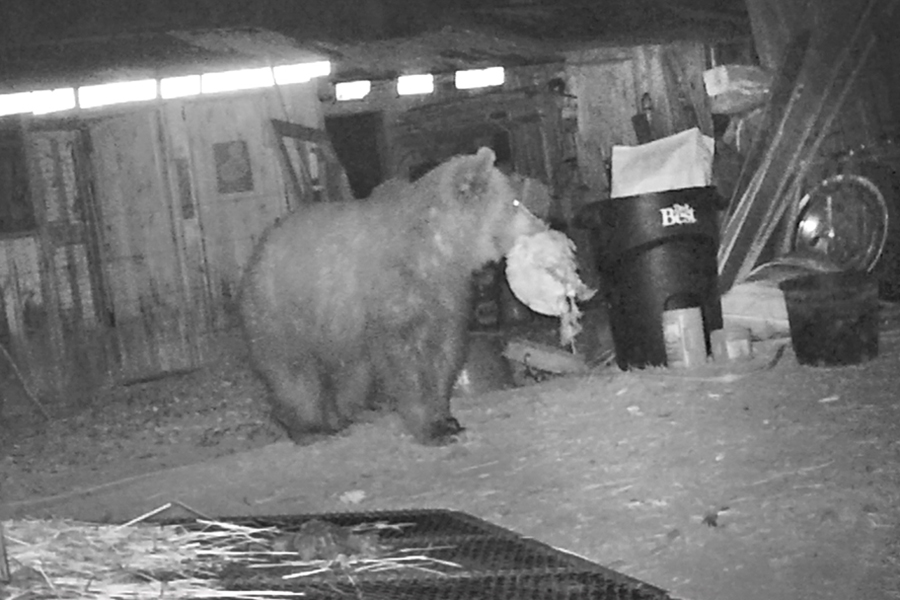Wildlife officials killed a grizzly that was breaking into chicken coops north of Kalispell after determining the subadult male bear was food conditioned, according to a press release from Montana Fish, Wildlife and Parks (FWP). And Glacier National Park rangers captured and killed a black bear in the Lake McDonald area after it broke into an employee cabin.
FWP officials captured the 3-year-old grizzly on May 30 off Lost Creek Drive west of Farm to Market Road and euthanized the animal. The bear had repeatedly broken into chicken coops and killed numerous chickens over several days.
A game camera also documented the grizzly breaking into unsecured garbage and bird feeders throughout the surrounding residential area. The bear weighed 195 pounds.
FWP determined the animal was food conditioned and that it posed a serious risk to public safety and to the animal. FWP euthanized the bear in consultation with the U.S. Fish and Wildlife Service and in accordance with Interagency Grizzly Bear Committee guidelines, according to a press release from the agency.
FWP is monitoring increased bear activity across Northwest Montana, including the Ferndale and Whitefish areas, and personnel are actively working to reduce conflicts in collaboration with landowners.
Residents are encouraged to report possible bear activity as soon as possible.
To report grizzly bear activity in the greater Flathead Valley, call FWP wildlife management specialists at (406) 250-1265. To report black bear and mountain lion activity in the greater Flathead Valley, call (406) 250-0062. To report bear activity in the Cabinet-Yaak area, call (406) 291-1320.
Officials are urging residents to remove or secure food attractants such as garbage and bird feeders and birdseed. Chicken and livestock should be properly secured with electric fencing or inside a closed shed with a door.
Anyone recreating in bear country should be aware of their presence and follow precautionary steps and tips to prevent conflicts, such as carrying bear spray.
For more safety information, visit fwp.mt.gov.
On June 3, Glacier National Park rangers euthanized a black bear in the Lake McDonald Lodge area after finding it had broken into a concession employee housing cabin. Nobody was present in the cabin at the time. The bear matched the description and photos of a bear who had been reported multiple times in the area since Memorial Day weekend.
On Friday, May 24, a black bear was reported in the Lake McDonald Lodge horse corral eating unsecured horse feed. That same night and the following morning, the bear returned, exhibiting little fear of humans or horses.
On Sunday, May 26, a private landowner in the immediate area reported that a bear had pushed in porch screens and caused other property damage at a local residence. Another nearby resident reported a black bear looking into their cabin windows.
For over a week, rangers spent hours in the Lake McDonald Lodge area locating the bear and using extensive aversive conditioning techniques to encourage the bear to seek out wild areas and natural food sources again. They made contact with the bear multiple times.
The male bear was euthanized consistent with Glacier National Park’s Bear Management Plan, in consultation with park wildlife biologists. The bear was estimated to be around nine-years-old and approximately 150 pounds. A field necropsy revealed it to be in otherwise healthy condition.
Food-conditioned bears are those that have sought and obtained non-natural foods, destroyed property or displayed aggressive, non-defensive behavior towards humans and are removed from the wild. Food-conditioned bears are not relocated due to human safety concerns.
Black bears are not good candidates for animal capture facilities such as zoos and animal parks due to the plentiful nature of the species throughout the United States.
Visitors are reminded to keep campgrounds and developed areas clean and free of food and trash. Local residents and businesses located in and around the park are reminded to secure all types of non-natural food sources including garbage, livestock, feed, pet food, bird seed, and hummingbird feeders.
If you see a bear along the road, please do not stop. Stopping and watching roadside bears will likely start a “bear jam” as other motorists follow your lead. “Bear jams” are hazardous to both people and bears as visibility is reduced and bears may feel threatened by the congestion. Report all bear sightings to the nearest ranger.
Glacier National Park is home to both black and grizzly bears. Hikers are highly encouraged to hike in groups, make noise when hiking, and have bear spray accessible and know how to use it. For more information about recreating in bear country, please visit http://www.nps.gov/glac/naturescience/bears.htm.
